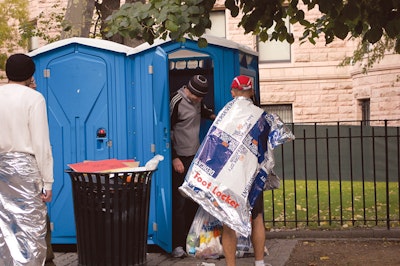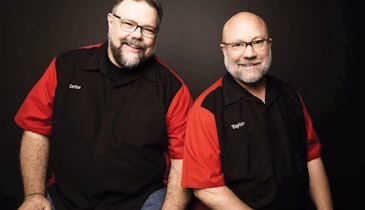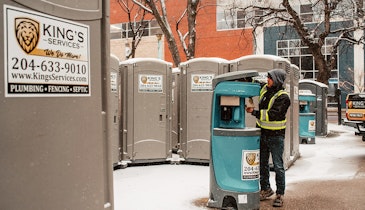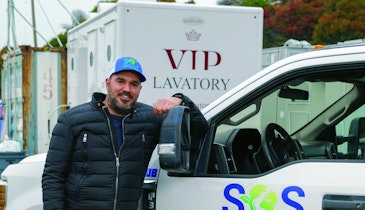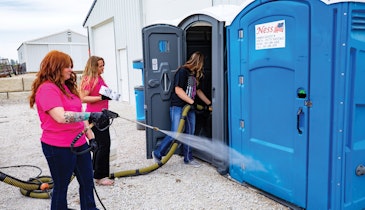Interested in Special Events?
Get Special Events articles, news and videos right in your inbox! Sign up now.
Special Events + Get AlertsIt’s shaping up to be another successful summer for portable restroom operators.
Construction is going gangbusters in many regions as a demand for housing grows, and commercial development and infrastructure improvements are moving forward. And special events — what can you say? Everything from street fairs in every small town to the massive crowds expected in certain locations for the Aug. 21 total eclipse of the sun are keeping PROs on top of their game.
All this activity begs a question for restroom technicians: Who are your worst users? Also, what job sites do you dread returning to for service or to pick up a unit to take back home? I know a number of you will say construction sites are the worst, hands down. I’ve heard PROs say construction workers can be messy, and there’s always that user or two who will take a cordless drill to the walls to add their own ventilation just for the fun of it.
HEADED THE WRONG DIRECTION
But a blog post I read recently gave me a new perspective on the worst users, calling out a group I never would have suspected as some of the messiest and discourteous: marathon runners. Writer Susan Lacke, at www.competitor.com, bemoaned the habits of fellow runners as she explored this portable sanitation crisis.
“If I walk into a bathroom at almost any civilized event venue, it’s clean and odor-free. I am all but guaranteed the soles of my shoes will not stick to the floor. I likely will not gag with disgust,” she explained. “At a pre-race portable toilet, not so much. There is pee on the seat. There is pee on the wall. There is a lake of pee on the floor. And that’s just the pee — don’t even get me started on the colonic exorcisms that apparently take place in every stall.”
Now I am intrigued. Running races that bad, really? The last time I ran in a race was so long ago it was before the advent of portable sanitation. Really. I once participated an 8K race with 30,000 runners and I am certain there were no restrooms in sight. Now that I think about it, how did they pull off those huge fun runs in the early 1980s without portable restrooms? You guys rock for providing a vital summertime service! But back to the story.
So Lacke met a portable restroom operator once who noticed she was wearing a shirt with a race logo. He asked if she was a runner, and then responded, “Oh man, when it comes to this industry, runners are the worst.” The PRO went on to explain that first off, race organizers tend to under-order units for the type and number of users. And second, runners tend to mess up every part of the unit with human waste, apparently liquids and solids, from those sticky floors to the toilet seat to the ceiling.
“The ceiling?” Lacke asked. But she didn’t really want to know. However, she could relate in years of running.
“I’m always floored by the sheer grossness of it all. But I never really considered that runners were more disgusting users than, say, attendees of a music festival,” she wrote.
HOW CAN WE IMPROVE?
The PRO confirmed this. “Music festivals are great. I can clean up and turn around a unit from those in less than five minutes.” He said runners deposit all forms of foreign materials in the portable restroom holding tanks, from those disposable warming blankets to sunglasses to energy food wrappers. They might have to fish out a container-load after a big race.
“You hear this? Runners make more of a mess than drunk frat boys at a Kid Rock concert,” Lacke lamented, and then went on to share some restroom etiquette tips for runners. Let’s hope they’re paying attention.
Whether it’s a race organizer, a construction company or the folks who put on your local county fair, share a few tips with clients to make sure they never hear horror stories like the ones told by Lacke. If they heed your advice, they’ll be much happier with their restroom service in the long run. For starters:
- Order right: It’s imperative for PROs to establish themselves as experts at estimating how to best serve large crowds with portable sanitation services. Be firm in sharing your best advice on the number of restrooms needed for any event and don’t back down when clients want to cut the order. Explain the consequences of ordering too few restrooms or services, noting that filthy restrooms can kill the reputation of a special event or reverse the positive attitude of workers on a job site. In some instances, you may have to turn down work if a short order will cause your company’s reputation to suffer. Remember it’s your company name on the side of the restrooms and you’ll be blamed for a dirty unit.
- Know your users: Event planners at a beer festival better know the urinals could be overflowing. Construction companies need to be aware if their workers are prone to vandalizing portable restrooms. Recommend your clients give a lot of thought to how your units will be used before they place the order. They need to cater to special needs and situations. For example, provide timesaving urinal units for outdoor festivals that emphasize food and drink, and offer customers damage waivers as insurance against damaged units at construction sites.
- Monitor the situation: A client’s responsibility for clean portable restrooms doesn’t necessarily end when they place an order for your products and service. They need to keep an eye on the cleanliness of restrooms throughout an event or all month long on a construction site. Tell them to make regular rounds to make sure their users are having a satisfactory experience and to let you know as soon as they notice a problem. If event planners, for instance, don’t have time to monitor all the units at a festival, offer to have your attendants handle that important task — for a price. This monitoring will help the event as well as protect your business from criticism.
MAKING TRACKS
Whether your toughest tough job is a running race, another event or a construction project, you have plenty of time to make some improvements. You’re only about half way through the busy season and there’s plenty of work to do. Get after it.
